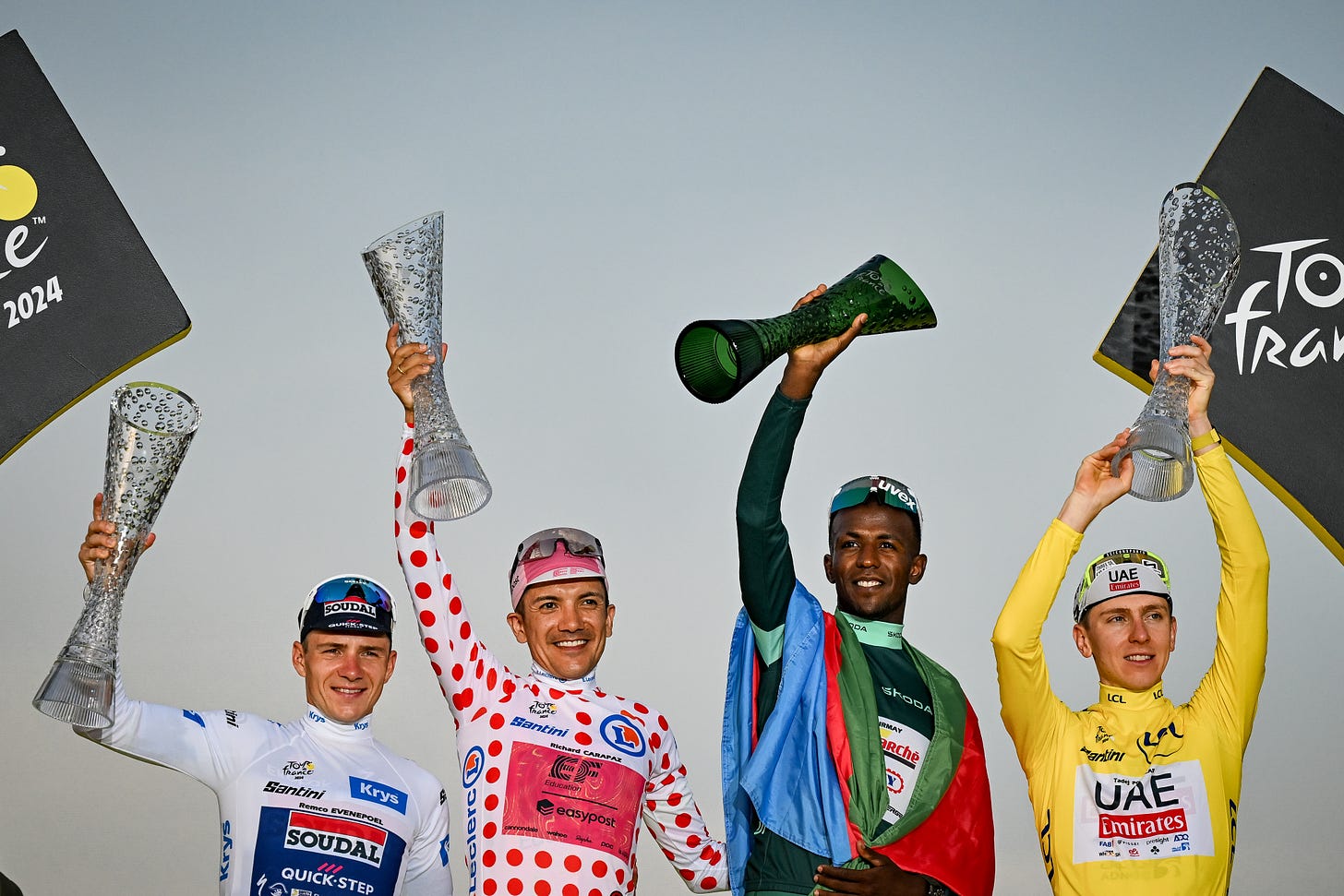Jesus Christ, He Actually Did It
Tadej Pogačar is already having the best road racing season of all time
Through 13 stages of the Tour de France, Tadej Pogačar had ended the day in the yellow jersey 11 times. At no point was he lower than fourth in the GC standings. He’d won a stage, finished second in two others, and held a lead of more than a minute on his two GC rivals, Jonas Vingegaard and Remco Evenepoel. This, just months after the most dominant Giro d’Italia win in 50 years, with six stage wins and a margin of victory that rounded up to 10 minutes.
Heading into this season, the last Giro-Tour double came in 1998. That year, fan favorite Marco Pantani took his only two career grand tour wins; his Tour victory was helped by the Festina Affair, which denuded the field of several of his chief rivals. It also helped that defending champion Jan Ullrich underdressed and underfueled for frigid conditions on the decisive mountain stage, handing the GC win to Pantani in one of modern cycling’s great choke jobs.
Pantani’s legend, if anything, underscores how difficult the Giro-Tour double really is. In the 25 years between Pantani and Pogačar, only five Giro champions even finished the tour, with just two of those ending up in the top five.1 If Pogačar could even cling onto a podium spot in the final week, it would mark one of the best stage racing seasons of the 21st century.
Instead, Pogačar won five of the final eight stages, including five of the six that had any reasonable expectation of moving the final needle. By race’s end, he was six minutes clear of Vingegaard, nine ahead of Evenepoel, and 19 minutes up on everyone else. Pogačar won the Giro by the largest margin since 1965; in his very next race start, he won the Tour by the third-largest margin of the 21st century.
The only two more lopsided Tours since Ullrich’s 1997 win were 2014, when Vincenzo Nibali put more than seven minutes into—respectfully—a bunch of tomato cans.2 The only other seven-minute margin of victory came last year, and even then, Vingegaard was 16 minutes up on eighth-place Felix Gall by the end of the race, as opposed to Pogačar’s 19-minute margin over fourth-place João Almeida this year.
Benji Naesen of the Lanterne Rouge podcast tweeted on the final day of the race that Pogačar is the greatest cyclist ever. And with four grand tours, 26 grand tour stage wins, and six monuments at the age of 25, things certainly seem to be trending that direction.
I bring this up to set up my next point, but also to share a reply I saw:
One of my personal pet peeves is making an assertion in a public forum and getting some response along the lines of “Uhhhh I think you misspelled [INSERT ALTERNATIVE HERE].” But even after having spent my adult life looking at the electronic musings of idiots who are neither funny nor insightful, this one is still up there in the dumbass blue check reply guy Hall of Fame. “Perhaps,” he thought to himself before hitting send, “this Belgian cycling commentator is not familiar with Eddy Merckx. I should send him Merckx’s Wikipedia page!”
Anyway, the question of whether Pogačar is the greatest ever is one for another day, mostly because I’m going to need content later and I don’t want to burn two ideas in one post.
I’m interested in whether he’s having the greatest season ever.
And I think that discussion starts with riders who have won two grand tours in a year. The thing that makes Pogačar so special is not that he’s a great Tour de France champion, but how great he is as an all-around rider.
Really since the 1980s, the guys who racked up Tour de France wins have tended to be highly specialized climber-time trialist hybrids. Super skinny dudes with efficient, slow-burning engines that’ll get you up and over Alpe d’Huez or Mont Ventoux with ease, but are definitionally incapable of the explosiveness required to win a major single-day stage race—even one like Il Lombardia, which is well-suited to climbers.
Sometimes, a guy like this will, through tactical nous or sheer audacity, pull off a win in a major one-day race. Greg LeMond won the world road race championship twice in this fashion, and Nibali won three monuments, including a Milan-San Remo. And sometimes a more explosive rider would put it all together and win a grand tour, like Cadel Evans at the 2011 Tour de France or Alejandro Valverde at the 2009 Vuelta.
Pogačar is more of the latter. He’s more of a puncheur with the legs to hack it at a grand tour. And if you look at the top stage racers in the world, that’s becoming the norm. Evenepoel is that kind of rider, as is Primož Roglič, who was probably the guy we should credit with squaring the circle. Evans or Valverde could win a grand tour under ideal circumstances; Roglič and Pogačar can win them consistently, while still attacking Ardennes-type classics.3
Qualitatively, that means Pogačar tends to attack more, rather than riding out a more conservative, reactive strategy. White Froome and Contador would frequently win grand tour GC titles without taking an individual stage, Roglič and Pogačar habitually contest sprint finishes within the GC group, even on mild finishes. To some extent that’s a stylistic preference, but it’s why Roglič won at least one stage in each of his first seven grand tour starts, and Pogačar took multiple stage wins in each of his seven career grand tour starts.4
The two Slovenian stars are now tied on the grand tour GC win leaderboard with four. Among the 15 riders with four or more grand tour wins, they are sixth and ninth in stage wins despite being 15th and 11th in race starts.
Pogačar has 12 grand tour stage wins this year alone; Froome has 14, Nibali 15 in 27 race starts, and Miguel Induráin only 16. In their entire careers. Contador, that great artist and big-mountain attacker, has 10 career grand tour stage wins; even if you give back the two he lost for doping, it still took him an entire career to put up the numbers Pogačar has in three months.
If you sort the top 15 grand tour riders in terms of stage wins per race, there are four riders who averaged at least three stage wins per start: Merckx, Alfredo Binda, Pogačar, and Bernard Hinault. So that’s Pogačar, a guy from the stone age, and the two greatest grand tour riders who ever lived. Nobody else averages more than 1.82 stage wins per start. Vingegaard, for all his high-mountain prowess, has six stage wins in six career grand tour starts.
But what amazes me about Pogačar is not that he can win multiple Tours de France. I haven’t been aware of cycling that long, but I’ve seen that. Vingegaard has done it. So have Chris Froome and Alberto Contador and—if you want to go back and scrape the white-out off the record book—Lance Armstrong.
What I hadn’t seen was someone who could win multiple Tours de France and the Tour of Flanders. Who could wreck everyone’s shit in Strade Bianche—which is technically a rough-terrain classic—and wreck everyone’s shit even worse at two grand tours a couple months later.






